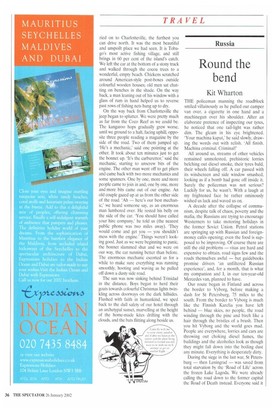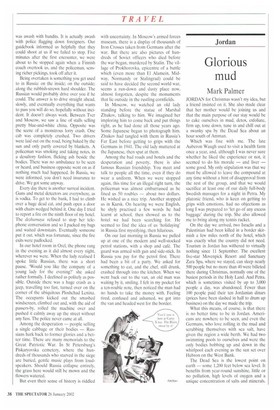Russia
Round the bend
Kit Wharton
THE policeman manning the roadblock smiled villainously as he pulled our camper van over, a cigarette in one hand and a machinegun over his shoulder. After an elaborate pretence of inspecting our tyres, he noticed that one tail-light was rather dim. The gleam in his eye brightened. 'Your machina kaput,' he said slowly, drawing the words out with relish. 'All finish. Machina criminal. Criminal!'
All around us, streams of other vehicles remained unmolested, prehistoric lorries belching out diesel smoke, their tyres bald, their wheels falling off. A car passed with its windscreen and side window smashed, looking as if a bomb had gone off inside it. Surely the policeman was not serious? Luckily for us, he wasn't. With a laugh at my frightened face he rather ominously wished us luck and waved us on.
A decade after the collapse of communism, despite talk of chaos, poverty and the mafia, the Russians are trying to encourage Westerners to take motoring holidays in the former Soviet Union. Petrol stations are springing up with Russian and foreignmoney cafés opening; even the food is supposed to be improving. Of course there are still the old problems — visas are hard and expensive to obtain, road signs few and the roads themselves awful — but guidebooks promise drivers 'an unfiltered Russian experience', and, for a month, that is what my companion and I, in our ten-year-old Mercedes van, planned to have.
Our route began in Finland and across the border to Vyborg, before making a dash for St Petersburg, 75 miles to the south. From the border to Vyborg is much like the Finnish Karelia you have left behind — blue skies, no people, the road winding through the pine and birch like a hair through the bristles of a brush. Then you hit Vyborg and the world goes mad. People are everywhere, lorries and cars are throwing out choking diesel fumes, the buildings and the alcoholics look as though they might fall down into the boiling dust any minute. Everything is desperately dirty.
During the siege in the last war, St Petersburg — then Leningrad — was saved from total starvation by the 'Road of Life' across the frozen Lake Lagoda. We were already calling the road down to the former capital the Road of Death instead. Everyone said it
was awash with bandits. It is actually awash with police flagging down foreigners. Our guidebook informed us helpfully that they could shoot at us if we failed to stop. Five minutes after the first encounter, we were about to be stopped again when a Finnish coach overtook us, and the policeman, sensing richer pickings, took off after it.
Being overtaken is something you get used to in Russia: on the inside; on the outside; along the rubbish-strewn hard shoulder. The Russian would probably drive over you if he could. The answer is to drive straight ahead, slowly, and eventually evetything that wants to pass you will do so, hopefully without incident. It doesn't always work. Between Tver and Moscow, we saw a line of stalls selling pretty blue-and-white china. Opposite was the scene of a monstrous lorry crash. One cab was completely crushed. Two drivers were laid out on the road, being baked by the sun and only partly covered by blankets. A policeman was smoking and taking notes, in a desultory fashion, flicking ash beside the bodies. There was no ambulance to be seen or heard, and business opposite went on as if nothing much had happened. In Russia, we were informed, you don't need insurance to drive. We got some anyway.
Every day there is another surreal incident. Guns and metal detectors are everywhere, as is vodka. To get to the bank, I had to climb over a huge dead cat, and push open a door with chairs wedged behind it. One day I tried to report a fire on the ninth floor of my hotel. The dezhurnaya refused to stop her telephone conversation and so I packed my bags and waited downstairs. Eventually someone put it out, which was fortunate, since the fire exits were padlocked.
In our hotel room in Orel, the phone rang in the evening as it did almost every night, wherever we were. When the lady realised 1 spoke little Russian, there was a short pause. 'Would you like the company of a young lady for the evening?' she asked rather formally. I declined as politely as possible. Outside there was a huge crash as a jeep, travelling too fast, turned over on the corner of the ubiquitous Ploshchad Lenina. The occupants kicked out the smashed windscreen, climbed out and, with the aid of passers-by, rolled the machine over and pushed it calmly away up the street without any fuss. The police never came at all.
Among the desperation — people selling a single cabbage or their bodies — Russians hark back to former glories and a better time. There are many memorials to the Great Patriotic War. In St Petersburg's Piskaryovska cemetery, where the hundreds of thousands who starved in the siege are buried, gentle music plays from loudspeakers. Should Russia collapse entirely, the grass here would still be mown and the flowers watered.
But even their sense of history is riddled with uncertainty. In Moscow's armed forces museum, there is a display of thousands of Iron Crosses taken from Germans after the war. But there are also pictures of hundreds of Soviet officers who died before the war began, murdered by Stalin. The village of Prokhorovka, epicentre of a battle which (even more than El Alamein, Midway, Normandy or Stalingrad) could be said to have decided the second world war, seems a run-down and dusty place now, almost forgotten, despite the monuments that lie outside in the rustling cornfields.
In Moscow, we watched an old lady standing before the statue of Marshal Zhukov, talking to him. We imagined her imploring him to come back and put things right, as he had done all those years ago. Some Japanese began to photograph him. Zhukov had tangled with them in Russia's Far East before getting to grips with the Germans in 1941. The old lady muttered at the Japanese, then spat at them.
Among the bad roads and hotels and the desperation and poverty, there is also famous Russian friendship. You meet and talk to people all the time, even if they do wear a uniform. When we were stopped again, this time for an illegal right turn, the policeman was almost embarrassed as he fined us 50 roubles — about two dollars. He wished us a nice trip. Another stopped us in Kursk. On hearing we were English, he shyly practised a few words he had learnt at school, then showed us to the hotel we had been searching for. He seemed to find the idea of us 'holidaying' in Russia first mystifying, then hilarious.
On our last morning in Russia we pulled up at one of the modern and well-stocked petrol stations, with a shop and café. The guard was armed with gun and side-stick. In Russia you pay for the petrol first. There had been a bit of a party. We asked for something to eat, and the chef, still drunk, crashed through into the kitchen. When we went back out to the van, an old man was waiting by it, smiling. I felt in my pocket for a ten-rouble note, then noticed the man had no hands to take the money with. Feeling tired, confused and ashamed, we got into the van and headed west for the border.



















































































 Previous page
Previous page